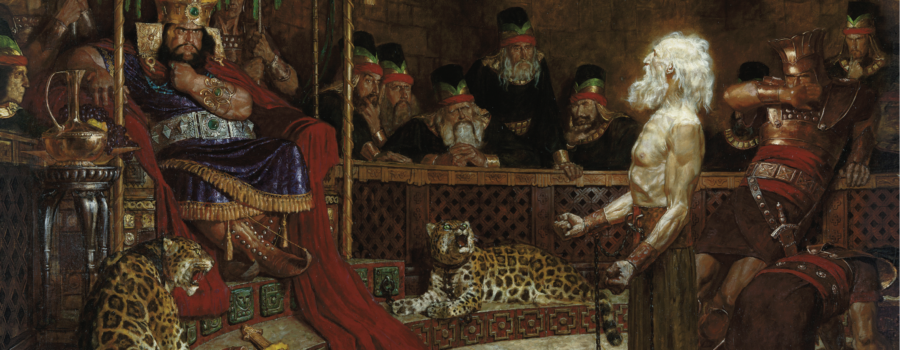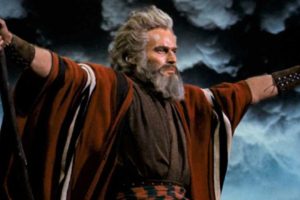Avinodi’s visit to the court of King Noach at Lechi-Nefi, in which he pleaded for them to repent of their iniquity, seems to have occurred at Shavuot. At this Shavuot even, Avinodi gave Noach a beautiful drash, that tied the giving of the ten commandments to the coming of the Messiah to live among the children of men. Noach and his priests threatened Avinodi that unless he recanted all the words he had spoken against them, they would kill him. Avinodi stood by his words and Noach had him burned with fire. (See Moshiyah 7:10-9:5)
How do we know that this event likely took place at Shavuot? Consider first this passage:
And it came to pass that after the space of two years, that Avinodi came among them in disguise, that they knew him not, and began again to prophesy among them,…(Moshiyah 7:10)
This reminds us of Yeshua’s actions as described in the book of Yochanan (John):
[1] After these things Yeshua walked in Galilee: for he would not walk in Judea, because the Jews sought to kill him.
[2] Now the Jews’ feast of tabernacles was at hand.
[3] His brethren therefore said unto him, Depart hence, and go into Judaea, that thy disciples also may see the works that you do.
[4] For there is no man that does any thing in secret, and he himself seeks to be known openly. If thou do these things, show thyself to the world.
[5] For neither did his brethren believe in him.
[6] Then Yeshua said unto them, My time is not yet come: but your time is always ready.
[7] The world cannot hate you; but me it hates, because I testify of it, that the works thereof are evil.
[8] Go ye up unto this feast: I go not up yet unto this feast; for my time is not yet full come.
[9] When he had said these words unto them, he abode still in Galilee.
[10] But when his brethren were gone up, then went he also up unto the feast, not openly, but as it were in secret. (John 7:1-8 KJV modified)
Yeshua knew that his life would be endangered if he went to Judea. He avoided Judea until the feast of Sukkot (Tabernacles) and then “he also came upon the feast, not openly, but as it were in secret.”
It seems likely that Avinodi took similar action, entering the city at the most ideal time to both disappear among a crowd, and also reach a large audience, on a feast day. He came “in disguise,” not openly, but in secret. In this case, a multitude of evidence points to Shavuot as feast on this occasion.
The Matan Torah (Gift of Torah)
According to Torah, the Ten Commandments were first given during the third month after Passover (Exodus 19:1) and according to a tradition preserved in the Talmud, specifically at Shavuot: “Our Rabbis taught: On the sixth day of the month [Sivan] were the Ten Commandments given to Israel.” (b.Shabbat 86b)
There is much to connect Avinodi’s teaching at Lechi-Nefi with the giving of the Torah on Mount Sinai.
In his drash, Avinodi repeats the Ten Commandments:
And it shall come to pass that you shall be smitten for your iniquities, for you have said that you teach the Torah of Moshe. And what know you concerning the Torah of Moshe? Does salvation come by the Torah of Moshe? What say you? And they answered and said that salvation did come by the Torah of Moshe. But now Avinodi said unto them, I know if you keep the mitzvot of Elohim, you shall be saved; yes, if you keep the mitzvot which YHWH delivered unto Moshe in the mount of Sinai, saying, I am YHWH your Elohim, who has brought you out of the land of Egypt, out of the house of bondage. You shall have no other Elohim before me. You shall not make unto you any graven image, or any likeness of anything in the Heaven above, or things which are in the earth beneath. (Ex. 20:2-4) Now Avinodi said unto them, Have you done all this? I say unto you, no, you have not. And have you taught this people that they should do all these things? I say unto you, no, you have not….
And now you remember that I said unto you, You shall not make unto you any graven image, or any likeness of things which are in Heaven above, or which are in the earth beneath, or which are in the water under the earth. And again, You shall not bow yourself down unto them nor serve them, for I, YHWH your Elohim, am a jealous Elohim, visiting the iniquities of the fathers upon the children unto the third and fourth generation of them that hate me, and showing mercy unto thousands of them that love me and keep my mitzvot. You shall not take the name of YHWH your Elohim in vain, for YHWH will not hold him guiltless that takes his name in vain. Remember Shabbat, to keep it holy. Six days shall you labor and do all your work; but the seventh day, the Shabbat of YHWH your Elohim, you shall not do any work, neither you, nor your son, nor your daughter, neither your manservant nor your maidservant, nor your cattle, nor the stranger that is within your gates. For in six days YHWH made Heaven, and earth, and the sea, and all that in them is; wherefore, YHWH blessed the Shabbat and hallowed it. Honor your father and your mother, that your days may be long upon the land which YHWH your Elohim gives you. You shall not kill. You shall not commit adultery. You shall not steal. You shall not bear false witness against your neighbor. You shall not covet your neighbor’s house; you shall not covet your neighbor’s wife, nor his manservant, nor his maidservant, nor his ox, nor his ass, nor anything that is your neighbor’s. (Moshiyah 7:18, 21; see also Ex. 20:4-17)
Furthermore, we are told that Avinodi’s face shined, just as Moses’ face shined while at mount of Sinai, while speaking with YHWH:
Now it came to pass after Avinodi had spoken these words that the people of king Noah dared not lay their hands on him, for the spirit of YHWH was upon him. And his face shone with exceeding luster, even as Moshe’s did while in the mount of Sinai while speakingwith YHWH….(Moshiyah 7:20)
This compares with the face of Moshe at the Matan Torah (gift of Torah):
[29] And it came to pass, when Moses came down from mount Sinai with the two tables of testimony in Moses’ hand, when he came down from the mount, that Moses wist not that the skin of his face shone while he talked with him.
[30] And when Aaron and all the children of Israel saw Moses, behold, the skin of his face shone; and they were afraid to come nigh him. (Ex. 34:29-30 KJV)
A Harvest Festival
The harvest festival theme of Shavuot was also an especially appropriate time for the curse on the crops of the people of Lechi-Nefi, which Avidodi pronounces in his drash:
And it shall come to pass that I will send forth hail among them, and it shall smite them, and they shall also be smitten with the east wind, and insects shall pester their land also and devour their grain; and they shall be smitten with a great pestilence. And all this will I do because of their iniquities and abominations. (Moshiyah 7:12)
Parallels with Psalm 50
A traditional part of the Shavuot liturgy is Psalm 50, which has many parallels with Avinodi’s drash. For example we read in Psalm 50:3 “Our Elohim shall come, and shall not keep silence” (Ps. 50:3) which connects well with the words of the Torah describing the gift of the Ten Commandments “YHWH will come down in the sight of all the people” (Ex. 19:11). Avinodi draws a parallel with the coming of the Messiah saying: “Elohim himself shall come down among the children of men.” (Moshiyah 8:6)
Psalm 50:13-14 also indicates that Elohim prefers thanksgiving to sacrifices
[13] Will I eat the flesh of bulls, or drink the blood of goats?
[14] Offer unto God thanksgiving; and pay thy vows unto the most High (Psalm 50:13-14 KJV)
While Avinodi calls for Elohim’s commandments to be “written in your hearts.” (Moshiyah 7:20)
Both Psalm 50:16, 22 and Avinodi in his drash, call us to keep the Torah not just proclaim it:
[16] But unto the wicked God saith, What hast thou to do to declare my statutes, or that thou shouldest take my covenant in thy mouth?
[17] Seeing thou hatest instruction, and castest my words behind thee.
[18] When thou sawest a thief, then thou consentedst with him, and hast been partaker with adulterers.
[19] Thou givest thy mouth to evil, and thy tongue frameth deceit.
[20] Thou sittest and speakest against thy brother; thou slanderest thine own mother’s son.
[21] These things hast thou done, and I kept silence; thou thoughtest that I was altogether such an one as thyself: but I will reprove thee, and set them in order before thine eyes.
[22] Now consider this, ye that forget God, lest I tear you in pieces, and there be none to deliver.
(Psalm 50:16-22 KJV)
And likewise Avinodi says:
Thus says YHWH: Woe be unto this people, for I have seen their abominations, and their wickedness, and their whoredoms; and except they repent, I will visit them in my anger. And except they repent and turn to YHWH their Elohim, behold, I will deliver them into the hands of their enemies; yes, and they shall be brought into bondage, and they shall be afflicted by the hand of their enemies. And it shall come to pass that they shall know that I am YHWH their Elohim and am a jealous Elohim, visiting the iniquities of my people. And it shall come to pass that except this people repent and turn unto YHWH their Elohim, they shall be brought into bondage; and none shall deliver them except it be YHWH, El Shaddai….(Moshiyah 7:8)
…Therefore, what do you teach this people? And they said, We teach the Torah of Moshe. And again he said unto them, If you teach the Torah of Moshe, why do you not keep it? Why do you set your hearts upon riches? Why do you commit whoredoms and spend your strength with harlots? Yes, and cause this people to commit sin, that YHWH has cause to send me to prophesy against this people, yes, even a great evil against this people? Do you not know that I speak the truth? Yes, you know that I speak the truth, and you ought to tremble before Elohim. (Moshiyah 7:17)
Conclusion
When all of these facts are considered it seems very likely that the festival of Shavuot served as the backdrop for the events recorded Moshiyah 7-9, once again demonstrating that the Stick of Joseph is, after all, an authentic ancient Jewish record.






Leave a Reply